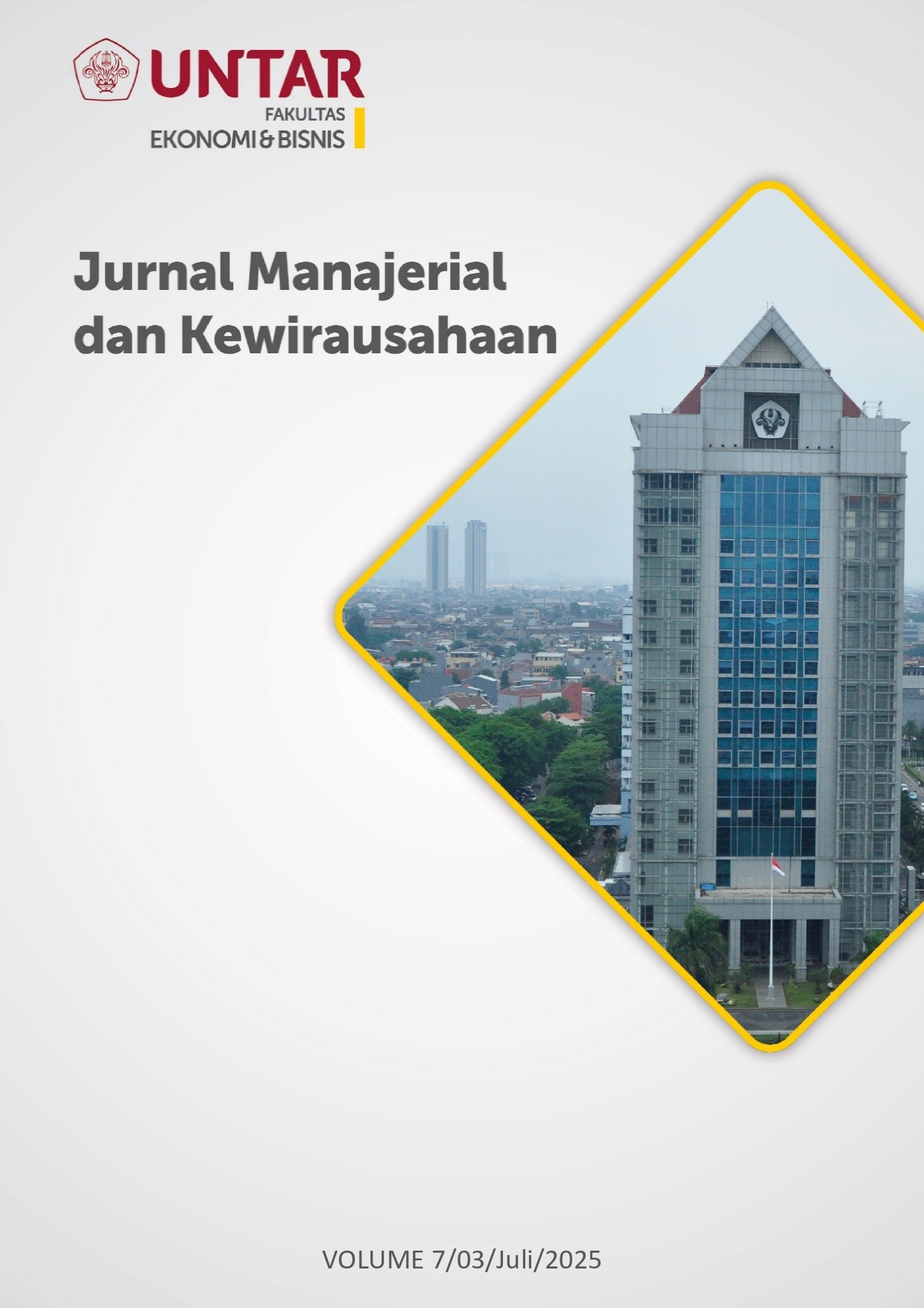Pengaruh Fenomena Korean Wave dan Inovasi terhadap Pertumbuhan Usaha UMKM Kuliner Korea
Main Article Content
Abstract
UMKM menjadi pilar penting dalam perekonomian dan merangsang peluang baru. Era globalisasi ini UMKM diharapkan dapat memperluas jangkauan pasar dengan menyesuaikan produk. Gelombang Korea adalah salah satu efek globalisasi dan Indonesia tidak luput dari tumbuh kembangnya budaya Korea, yang dapat dirasakan dari penyebaran produk-produk Korea. Di zaman sekarang ini perlu adanya inovasi seiring dengan pergeseran pasar. Penelitian ini bertujuan untuk mengetahui pengaruh gelombang Korea dan inovasi terhadap pertumbuhan usaha UMKM di bidang kuliner Korea. Sampel penelitian sebanyak 114 responden dari pemilik usaha yang menjual kuliner Korea. Kriteria responden adalah memiliki usaha di Jakarta dan sudah menjalankan usaha lebih dari satu tahun. Teknik non probability sampling dengan metode pemilihan sampel purposive sampling digunakan dengan cara menyebarkan kuesioner secara online melalui Google Form. Pengolahan data menggunakan PLS-SEM. Hasil penelitian menunjukan bahwa gelombang Korea dan inovasi berpengaruh positif dan signifikan pada pertumbuhan usaha UMKM di bidang kuliner Korea.
MSMEs are an important pillar in the economy and stimulate new opportunities. In this era of globalization, MSMEs are expected to expand their market reach by adjusting their products. The Korean Wave is one of the effects of globalization and Indonesia is not immune to the growth of Korean culture, which can be felt from the spread of Korean products. Currently, innovation is needed along with market shifts. This study aims to determine the effect of the Korean wave and innovation on the growth of MSME businesses in the Korean culinary sector. The research sample was 114 respondents from business owners who sell Korean cuisine. The respondent criteria are having a business in Jakarta and having been running a business for more than one year. The nonprobability sampling technique with the purposive sampling sample selection method was used by distributing questionnaires online via Google Form. Data processing using PLS-SEM. The results of the study showed that the Korean wave and innovation had a positive and significant effect on the growth of MSME businesses in the Korean culinary sector.
Article Details
Section

This work is licensed under a Creative Commons Attribution-NonCommercial-ShareAlike 4.0 International License.
This work is licensed under a Jurnal Muara Ilmu Ekonomi dan Bisnis Creative Commons Attribution-ShareAlike 4.0 International License.,/p>
References
Angelina, & Handoyo, S. E. (2024). The influence of market orientation, entrepreneurship orientation, business strategy, and innovation on the performance. International Journal of Application on Economics and Business, 2(1), 2970-2978. https://doi.org/10.24912/ijaeb.v2i1.2970-2978
Bennis (2011). Management Organization. South-Western, West Texas.
Christopher H. Tienken (2013) International Comparisons of Innovation and Creativity, Kappa Delta Pi Record, 49:4, 153-155
Ghozali, I. (2021). Aplikasi Analisis Multivariate Dengan Program IBM SPSS 26
Ghozali, Imam dan Hengky Latan (2015). Partial Least Squares Konsep Teknik dan Aplikasi dengan Program Smart PLS 3.0. Semarang: Universitas Diponegoro Semarang
Ghozali, Imam. 2016. Aplikasi Analisis Multivariete Dengan Program IBM SPSS 23 (Edisi 8). Cetakan ke VIII. Semarang: Badan Penerbit Universitas Diponegoro.
Jang, G., & Paik, W. K. (2012). Korean Wave as tool for Korea’s new cultural diplomacy. Advances in Applied Sociology, 2(03), 196.
Kim, J. (2023). Immigrant Entrepreneurship and the Rising Popularity of Korean Cuisine: Korean Restaurant Businesses in Frankfurt. Pacific Focus, 38(2), 288-313.
Kumari, K. N. B., & Devi, M. U. (2023). “Local Heroes, Global Players: Msme Expansion In The International Arena” (With Special reference to Select MSMEs in East Godavari District, Andhra Pradesh). Journal for ReAttach therapy and developmental diversities, https://doi.org/10.53555/jrtdd.v6i10s(2).2575
Lee, Y. L., Jung, M., Nathan, R. J., & Chung, J. E. (2020). Cross-national study on the perception of the Korean wave and cultural hybridity in Indonesia and Malaysia using discourse on social media. Sustainability, 12(15), 6072.
Martín-García, R., & Morán Santor, J. (2021). Public guarantees: a countercyclical instrument for SME growth. Evidence from the Spanish Region of Madrid. Small Business Economics, 56(1), 427-449.
Nasution, M. I., Muhammad Fahmi, J., Muslih, & Prayogi, M. A. (2020). The Quality Of Small and Medium Enterprises Performance Using the Structural Equation Model-Part Least Square (Sem-Pls). Journal Of Physics: Conference Series.
Ronaldo, & Utama, L. (2024). Pengaruh mediasi kompetensi jaringan dalam kompetensi kewirausahaan pada pertumbuhan UMKM di Tanah Abang. Jurnal Manajerial dan Kewirausahaan, 6(1), 161-169. https://doi.org/10.24912/jmk.v6i1.28588
Sugiyono. (2017). Metode Penelitian Kuantitatif, Kualitatif, dan R&D. Bandung: Alfabeta, CV.
Theresa, I., & Hidayah, N. (2022). The effect of innovation, risk-taking, and proactiveness on business performance among MSMEs in Jakarta. Dalam Tenth International Conference on Entrepreneurship and Business Management 2021, 42-48. https://doi.org/10.2991/aebmr.k.220501.008
Verbyani, V., & Handoyo, S. E. (2021). Pengaruh inovasi, orientasi kewirausahaan dan pasar terhadap keunggulan bersaing UKM kuliner. Jurnal Manajerial dan Kewirausahaan, 3(3), 875-883. https://doi.org/10.24912/jmk.v3i3.13219

